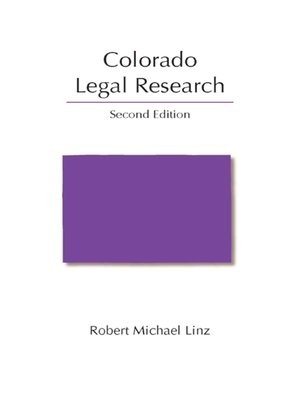
Sign up to save your library
With an OverDrive account, you can save your favorite libraries for at-a-glance information about availability. Find out more about OverDrive accounts.
Find this title in Libby, the library reading app by OverDrive.



Search for a digital library with this title
Title found at these libraries:
| Library Name | Distance |
|---|---|
| Loading... |
Colorado Legal Research guides researchers through the resources and methods of Colorado legal materials. It describes the organization of the Colorado legal system, including the type of law that each branch creates and where it is published. Readers will learn how to
- find current and historical Colorado statutes;
- locate Colorado case law;
- use Colorado's online database to find Colorado regulations;
- research local government law; and
- formulate searches to efficiently and effectively locate law in databases.
The second edition builds upon the foundation of the first edition by expanding the coverage of research topics and methods. In Part I, researchers will find a new chapter on citator research and expanded and revised chapters on Colorado regulatory research and legislative history research, both of which are particularly challenging in Colorado. In Part II, readers will find step-by-step guides with illustrations on researching primary and secondary authority. The text covers all of the major legal database providers including Bloomberg Law and Casemaker, the legal research database of the Colorado Bar Association. It also shows how to use Colorado government websites to find the law.
Colorado Legal Research goes beyond resources and methods to present an overall framework through which to carry out legal research assignments. The framework provides suggestions on how to analyze and conceptualize legal research problems, and offers pointers on how to understand legal research concepts and publishing techniques to identify and navigate the underlying legal research system. The clear explanations of resources and methods coupled with illustrations will make Colorado Legal Research useful for all researchers of Colorado law.







